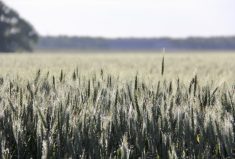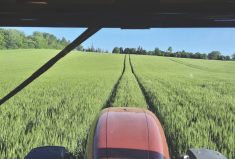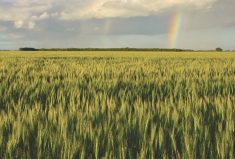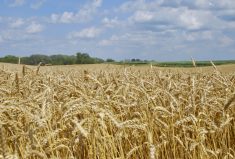Shelley Spruit likes to say she began a thriving farm business with a single cup of seed. In fact, there’s a certain rightness to her choosing those exact words, as if it was a recipe. After all, Spruit can run a kitchen and turn out five-course meals just as well as she operates a farm and produces bountiful crops.
Spruitt, you see, is a chef and baker by trade as well as a fourth-generation Ontario farmer who has farmed outside Ottawa with her husband Tony for just over 30 years. Here, the couple has grown mostly corn and soybeans on their 250-acre farm before beginning an entirely new venture here five years ago.
Read Also
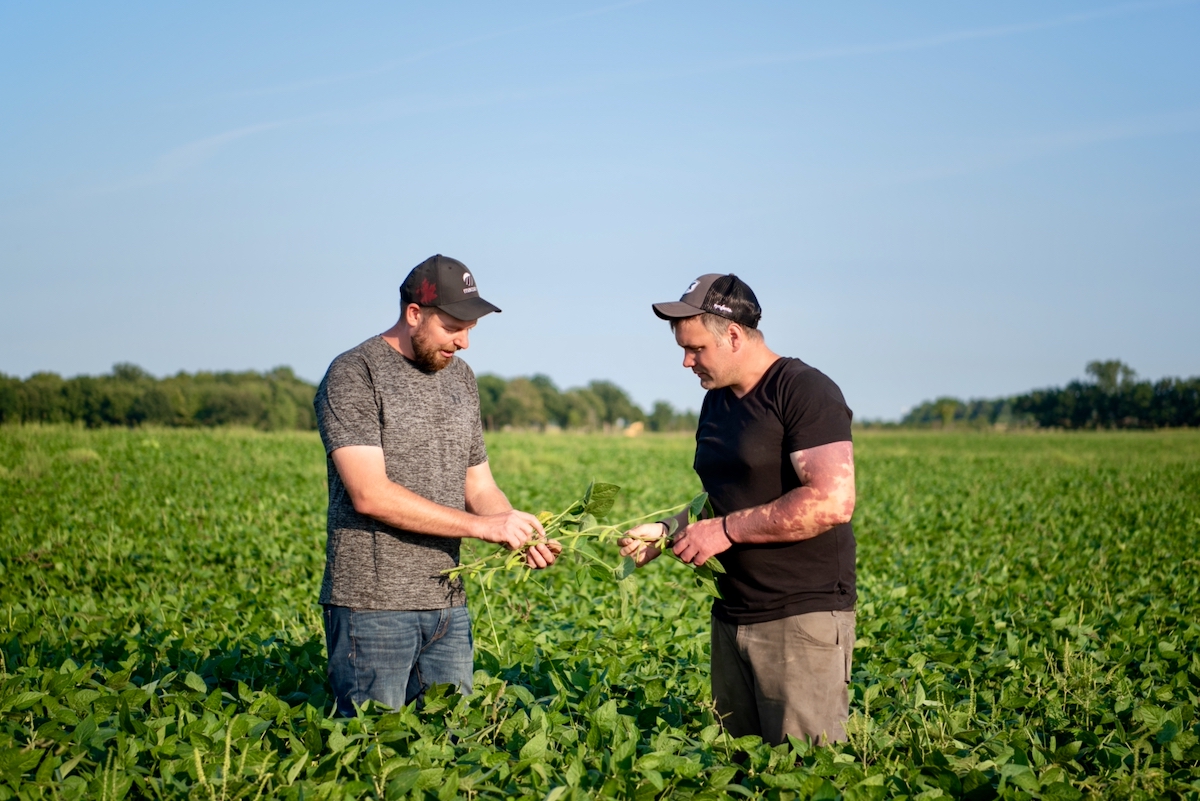
Ontario farmers partner for success
Ontario business partners, Matt Bergman and DJ Wassenaar, have been farming together for 10 years. Their focus on integrating unconventional…
That new venture is Against the Grains Farm, a subsidiary of the family’s farm, with a goal to engage in trialling and growing out varieties of ancient grains, and selling a variety of commercial wholesale and retail products made from them.
The idea for the business itself was planted when Shelley was eyeing selling another farm business she’d operated for over a dozen years. Her farm-to-table banquet hall had been a popular on-farm destination, offering meals made from ingredients sourced on their farm and from surrounding neighbours, plus delicious breads she’d baked from scratch. It was a time of learning about consumers’ interests in agriculture and dietary trends, too, says Spruit.
Selling the banquet hall business back in 2014, she thought at the time she might be getting out of the food business. Instead, she was about to transition right back into it.
“This was at the time of the gluten-free craze,” says Spruit. “I was really concerned about that, and I felt as a grain farmer I needed to be part of that conversation.”
She was watching, with growing alarm, consumers switching to nutritionally inferior rice flour and tapioca starch-based products, and knew what people were going to miss both from a cultural and a culinary perspective if they eliminated grain-based foods from their diet.
She also saw gluten-free diets leading to even more disconnection between eaters and what Canadian farmers actually grow. The last time she checked, she says, there was precious little rice grown on Canadian farms.
Initially, Spruit did set up a few plots of quinoa, millet and coloured corn to explore opportunities and options for what they might grow for new markets. But her attention was soon being drawn to ancient strains of wheat and other heritage grains as she began to read and learn about older strains of wheat and the research around the world looking at how some were better tolerated by those adversely affected by gluten.

This was around the time Spruit began sourcing out that single cup of seed, finding heritage varieties of grains, getting pseudo-grains like quinoa and amaranth from small seed companies or through connections she began to pursue with others interested in ancient grains.
What struck her was just how many varieties of wheat and barley were still to be found around the world.
“That was a real eye-opener to me,” she says.
However, she was also learning how short the supply of bulk seed was, how few registered varieties were available to Canadian growers, and how obscure the sources of this seed actually were. It made her think deeply about our dependency on a few leading crops, and the economic and agronomic risks farmers are in with an “all eggs in one basket” approach to cropping choices.
“I began this journey learning some startling facts, including that agricultural biodiversity has dropped 75 per cent in the last 100 years,” Spruit says. “That just blew me away.”
The first year, she got involved with researchers with Ontario Ministry of Agriculture, Food and Rural Affairs (OMAFRA) and their speciality crop division trialling different varieties of quinoa.
It was a total failure. All seven varieties failed and the field looked like a tangle of weeds, she says.
“But the wheats and barley varieties from the seed I had sourced looked promising. So that’s where I decided to put my focus.”
As a next step, she connected with the participatory plant breeding (PPB) program at the University of Manitoba, and it was in meeting that program’s lead, Dr. Martin Entz of the university’s department of plant science, that her interest in participatory plant breeding began to intensify. She was fascinated that the process directly engages farmers in crop variety improvement and in the development of cultivars best suited to farmers’ own needs.
Learning more about this process gave her a sense of mission, says Spruit. “I just knew that I needed to be part of this.”
She was also talking with colleagues in her network of chefs and bakers around that time, learning about their needs and wants and their ongoing search for healthy, wholesome Canadian-grown ingredients to incorporate into their artisanal breads and menu items.
As a baker and farmer, says Spruit, she felt she spoke two languages. She was able to offer the culinary trade insights into the range of challenges facing farmers and help them learn what farmers currently grow. Meanwhile, she was also sharing her increasing knowledge of ancient grains and their flavours and nutritional profiles, and how they could be incorporated into breads and menu dishes.
Meanwhile, back on the farm she was testing more different types of grains with the traits and qualities that matched the needs of the bakers and chefs she spoke to. It became participatory plant breeding within a really interesting network collaboration with end-users.
Against the Grains Farm was launched in 2014. Today Spruit has added the title “ancient grain restorer” to her lengthening resumé, having spent the past several years engaged in a quest to educate herself and others about agricultural biodiversity and seed genetics, crop adaptability and the potential for creating a “terroir for grains,” or regionally adapted wheat and barley varieties, and the potential economic opportunities of expanding the range of crops farmers can produce.
Last year Spruit had 27 variety trials on her farm, including heritage wheats, barley, rye, plus another 31 varieties of heritage dried beans grown in test plots.
It’s also been a process of learning the intriguing tales to go with the seed.
“I had a gentleman approach me, an old-timer seed keeper and restorer, who can no longer maintain his grow out trials in the U.S., and he asked me to carry on the stewarding of some of those grains,” she says. “Some of his varieties came from Russia. And I’ve had a plant breeder in Cyprus who contacted me to send me some seed stock, wanting me to trial some of his varieties.”

Her company, Against the Grains Farm is now selling more than two dozen wholesale and retail products including purple barley, ancient amber wheat and a variety of purple and red corn flours, chips and taco shell products to bakers, restaurant owners and food manufacturers.
Her website emphasizes the importance of community connections to their farm and lists over 27 partnerships with a host of food-related organizations. One is a partnership with other farmers through the Ottawa region through a Community Supported Agriculture (CSA) agreement, offering consumers a “grain share” from Against the Grains, which is a weekly offering to CSA customers of specialty whole grains and flours and other products such as baking mixes or tortilla chips, made from the ancient grain varieties on their farm. She includes recipes and descriptions of the distinctive flavours and unique nutritional profiles of these grains.
“I would say the variety I’m most proud of is a wheat we now call Ancient Amber wheat,” she says, adding it was among the first they began to trial in 2014. From a minute amount, she has been able to bulk up seed stock over time and produce about 500 kg for sale last year. Their fall harvest of 2019 ran over 10 tonnes.
“The feedback from bakers and chefs using it has been nothing short of phenomenal,” she says, adding that bakers are loving its strong gluten structure which makes it an excellent choice for sourdough breads. It also allows the pastry chef to work with a whole grain flour in many different applications.
Another very popular product is their Ancient Grain Medley, produced from a mix of whole grains including Amber wheat blended with purple barley and a hull-less barley developed in Canada.
“It was my answer to Uncle Ben’s Converted Rice,” says Spruit. “I just kept saying ‘We don’t grow rice in Canada, but we do grow an amazing variety of textures and flavours of grains.’ The chefs started picking it up and they’re loving it.”
She is now a frequent guest speaker at farm conferences and other venues where she talks about her vision for a seed-to-table value-chain for Canadian grains.
And if that wasn’t enough to keep her busy, she recently embarked on another significant leg of this journey to encourage more partnerships, and to raise farmers’ awareness about participatory plant breeding and what it offers them.
In 2018 she was a recipient of a Nuffield Canada scholarship, offered through the rural leadership program to enable chosen recipients a chance to pursue travel and study and deepen their knowledge and expertise on their selected agricultural topic.
Spruit’s two main research questions during her Nuffield travels were asking how participatory plant breeding can build resilience for farmers against the impacts of climate change, and how farmers can also begin developing and benefiting from the terroir identities for grains.
Spruit shared insights from her studies and travels in Fredericton, N.B., during Farm Management Canada’s Ag Ex 2019 convention, where she spoke of the innovation she sees being made possible as these seed-to-table partnerships emerge through participatory plant breeding programs.
Her travels took her to many corners of the globe, enabling her to visit sites such as the farmer-led trials for a culinary participatory plant breeding network in Oregon that links seed growers, produce buyers and chefs. Ecological Farmers of Ontario has also been working on farmer research projects encouraging farmers to do their own plant breeding trials focusing on the needs of their clients or farm.
Last year she attended conferences in both Italy and Denmark, meeting plant breeders and scientists from around the world working on heritage grain varieties to address a host of needs, including climate change.
Spruit also met farm groups developing specialized products from grains developed in their own collaborative networks and participatory plant breeding programs.
While in Denmark, for example, she met representatives of a Swedish farmers’ co-op who now collectively grow 6,000 hectares of rye, spelt and wheat varieties they’ve developed with plant breeders for adaptability to very specific soil and weather conditions.
“They now have 50 specialty products,” she told her Farm Management Canada audience. “They have their own mill so they can crack, roll and flake specialty grains according to product demand. They’ve really honed in on their marketing of the attributes of being a locally adaptable grain, and because of this collaboration and the thousands of tons they are able to produce, they approach large buyers to everybody’s benefit.”
It’s an example of farmers in another part of the world able to scale up what might otherwise be viewed as a niche enterprise, she says.
“All too often the word ‘niche’ conjures up a small and perhaps marginal enterprise,” she added. “This was a really good example of what participatory plant breeding and its partnering innovation can look like.”
Spruit’s Nuffield experience also took her to Scotland, where she visited a maltster who has formed a co-op of farmers who’ve worked with a plant breeder to develop unique barley varieties with traits better suited to their region’s soil and climate conditions. That co-operative is now scaling up to fill a growing demand for their specialty barleys, says Spruit.
“And that could certainly be applied to the Canadian market,” she added.
A highlight of her Nuffield travels was a trip to the country of Georgia, in the Caucasus region of Eurasia, a part of the world often referred to as the “cradle of wheat” for the sheer number of wheat varieties, including endemic varieties still grown there.
“Most of our grains that we know come out of Georgia, so it has become the hotspot for international plant breeders going there to select parental lines,” says Spruit. While there she met many more grain restorers and plant breeders who talked about their work to find traits for improved disease, pest and weather resilience, and their searches for new flavour profiles, and varieties that do not cause gluten sensitivities.
Against the Grains Farm now has a variety of wheat growing on their farm that came from one of the plant breeders she met there. Its original seed stock is sourced from Russia.
“It has proven itself over the last five years resistant to fusarium, and has an incredible protein profile,” she says. They’ve also begun producing flour from it and “bread bakers that we supply are quite enamoured with it,” she added.
Meanwhile, Spruit continues to take an avid interest in work going on in many other parts of North America, including that of organizations such as Washington State University’s Bread Lab Plant Breeding Program where researchers are working to develop grains best suited to the needs of both farmers and those using them for craft baking, malting, brewing and distilling.
Spruit will share her Nuffield conclusions in a report she is preparing to publish in 2020 on Nuffield Canada’s website.
Spruit’s main Nuffield argument is that participatory plant breeding deserves a greater profile and can play a much larger role as a solution provider in agriculture.
Participatory plant breeding projects can help renew minor cereal crops adapted to local and regional growing seasons, she says. They enable farmers to contribute genetically diverse crop material to agricultural systems, and in the race against the impacts of climate change and plant disease, will help produce regional demonstration projects showing how farmers are bolstering their resilience in face of these risks.
And while it’s going to take a whole lot more work to create demand for ancient grains, the effort should be worth it, because it will give more cropping alternatives and potential to develop new markets, she says.
Today she continues to partner with various organizations in participatory grain research, including the University of Manitoba as well as the U.S.-based Rocky Mountain Seed Alliance. She is also a board member of the Ecological Farmers of Ontario, Savour Ottawa and the Eastern Canada Grain Alliance.
Spruit says if there’s one thing she’s learned undertaking this entire project it is how fundamentally important it is for farmers to foster collaborations right across entire value chains.
“Eaters have been powerful advocates for the local food movement,” she says. “They can do the same for the local seed movement. We need to raise awareness about the importance of seed diversity and how good seeds make good sense.”




